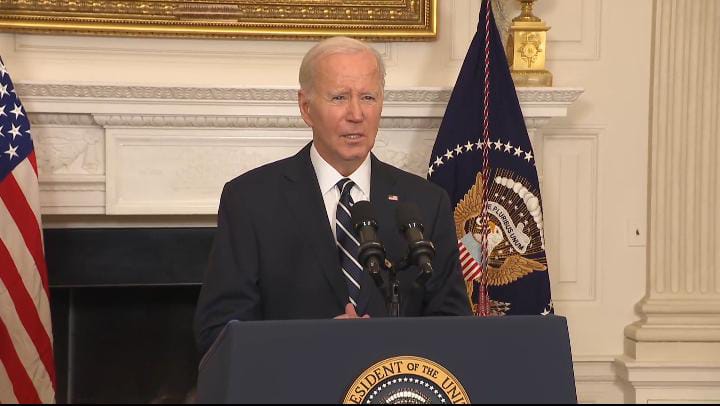
It is the first time American military personnel have been killed by hostile fire in the Middle East since the start of Israel’s war with Iran-backed Hamas, and the incident will further raise tensions in the region and fuel fears of a broader conflict directly involving Tehran.
“While we are still gathering the facts of this attack, we know it was carried out by radical Iran-backed militant groups operating in Syria and Iraq,” Biden said in a statement on the attack, pledging to hold “all those responsible to account at a time and in a manner of our choosing.”
Biden and Vice President Kamala Harris were briefed Sunday afternoon on the attack by several cabinet-level national security officials, the White House said.
Speaking later in the day at a South Carolina church banquet center, the president doubled down on his pledge of reprisals.
“We shall respond,” the president told the attendees, after holding a moment of silence for the US troops killed in the attack.
US Central Command put the number of wounded from the attack near the Syrian border at 25, and said the identities of those killed will be withheld pending notification of their families.
– ‘Regional explosion’
Hamas spokesman Sami Abu Zuhri called the attack “a message to the American administration that unless the killing of innocent people in Gaza stops, it may be faced with the entire (Muslim) nation.”
“The continuation of the American-Zionist aggression on Gaza risks a regional explosion,” Abu Zuhri said.
US Defense Secretary Lloyd Austin said he was “outraged and deeply saddened” by the deaths and injuries.
Jordanian government spokesman Muhannad Mubaidin meanwhile expressed his country’s “condolences to the United States for the victims of the attack,” which he said caused no Jordanian military casualties.
The escalating Middle East conflict poses a challenge to Biden in an election year, with various Republican politicians seeking to use the deadly attack to score political points, including former president Donald Trump, who described the situation as a “consequence of Joe Biden’s weakness and surrender.”
US and allied forces in Iraq and Syria have been targeted in more than 150 attacks since mid-October, according to the Pentagon, and Washington has carried out retaliatory strikes in both countries.
Many of the attacks on US personnel have been claimed by the Islamic Resistance in Iraq, a loose alliance of Iran-linked armed groups that oppose US support for Israel in the Gaza conflict.
On Sunday, the Islamic Resistance in Iraq said it targeted US personnel with drones at three locations in Syria, including two bases near where the borders of Iraq, Syria and Jordan meet.
The latest round of the Israel-Hamas conflict began when the Palestinian militant group carried out a shock attack on October 7 that resulted in about 1,140 deaths, mostly civilians, according to an AFP tally of official figures.
– Growing Middle East crisis
Following the attack, the United States rushed military aid to Israel, which has carried out a relentless military offensive that has killed at least 26,422 people in Gaza, most of them women and children, according to the Gaza health ministry.
Those deaths have sparked widespread anger across the region and stoked violence involving Iran-backed groups in Lebanon, Iraq and Syria as well as Yemen.
The Lebanon portion of the conflict has been limited to near daily exchanges of fire between Hezbollah and Israel, but American forces are directly involved in Iraq and Syria, as well as in Yemen.
Yemen’s Iran-backed Huthi rebels have carried out more than two months of attacks on shipping, saying they were hitting Israeli-linked vessels in support of Palestinians in Gaza.
The United States and Britain have responded with two rounds of joint strikes against the Huthis, while American forces have also carried out unilateral air raids against the rebels, who have also declared US and UK interests to be legitimate targets.
The growing violence in multiple parts of the Middle East has raised fears of a broader regional conflict directly involving Iran — a worst-case scenario that Washington is desperately seeking to avoid.
AFP




